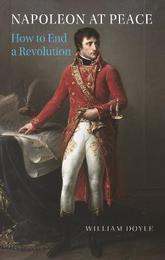
|
Napoleon at Peace: How to End a Revolution
Hardback
Main Details
| Title |
Napoleon at Peace: How to End a Revolution
|
| Authors and Contributors |
By (author) William Doyle
|
| Physical Properties |
| Format:Hardback | | Pages:248 | | Dimensions(mm): Height 216,Width 138 |
|
| Category/Genre | Napoleonic wars |
|---|
| ISBN/Barcode |
9781789146172
|
| Classifications | Dewey:944.05092 |
|---|
| Audience | |
|---|
| Illustrations |
8 illustrations
|
|
Publishing Details |
| Publisher |
Reaktion Books
|
| Imprint |
Reaktion Books
|
| Publication Date |
15 August 2022 |
| Publication Country |
United Kingdom
|
Description
The French Revolution facilitated the rise of Napoleon Bonaparte, but after gaining power he knew that his first task was to end it. In this book William Doyle describes how he did so, beginning with the three large issues that had destabilized revolutionary France: war, religion and monarchy. Doyle shows how, as First Consul of the Republic, Napoleon resolved these issues: first by winning the war, then by forging peace with the Church and finally by making himself a monarch. Napoleon at Peace ends by discussing Napoleon's one great failure - his attempt to restore the colonial empire destroyed by war and slave rebellion. By the time this was abandoned, the fragile peace with Britain had broken down, and the Napoleonic wars had begun.
Author Biography
William Doyle is Emeritus Professor of History and Senior Research Fellow at the University of Bristol, and a Fellow of the British Academy. His many books include The Oxford History of the French Revolution (1989, third edition 2018).
Reviews"Doyle argues incisively that Napoleon's primary aim during the Consulate was political rather than military, as he sought to reverse what he saw as the errors of the Republic--to restore executive authority, curb disorder and insurgency, and resolve the religious schism that was the legacy of the previous decade. This book goes far to explain what Napoleon meant when he talked of his commitment to 'end the revolution'."--Alan Forrest, Professor Emeritus in History, University of York "Doyle's enlightening history immerses us in a crucial phase of Napoleon's career and France's past with originality and erudition."--Tim Blanning, Emeritus Professor of Modern European History, University of Cambridge "Napoleon at peace may seem a contradiction in terms. Yet paradoxically, as Doyle shows in this incisive and perfectly judged study, it was the brief period when he was not at war, the fourteen months between March 1802 and May 1803, that saw his most constructive achievement: restoring religious and civil peace to France after a traumatic decade of revolution."--Munro Price, Professor of Modern European History, University of Bradford "To be sure, the French Revolution made Napoleon: officer commissions were no longer limited to nobility; the Corsican cultivated his celebrity with new forms of battle-focused propaganda; and, with great foresight, he appealed to le peuple, the emergent and dominating authority in politics. Many posit Napoleon's coup d'etat of 18 Brumaire (November 9, 1799) to be the end of the French Revolution, but, as Doyle argues in Napoleon at Peace, the 'popular genera'--to borrow a term from Burke--spent three more years ending the Revolution's wars on European kingdoms, on religion, and on monarchic authority, ultimately gaining one year of true peace before war broke out again in 1803."-- "New Criterion" "Napoleon at Peace has interesting and important things to say. . . . Written with the sort of elan that would inspire envy in a squadron of cavalry, Doyle's book provides a scholarly and succinct account of General Bonaparte's unmaking of the French Revolution and his own remaking as an absolute prince."-- "Literary Review"
|